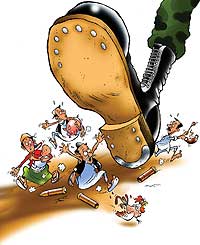 This township along the East-West Highway, west of the Narayani River, used to be a quiet, peaceful place. Farmers and traders came here to make phone calls and buy newspapers. They sat along the streets, drinking tea, talking politics. Nothing really exciting ever happened here.
This township along the East-West Highway, west of the Narayani River, used to be a quiet, peaceful place. Farmers and traders came here to make phone calls and buy newspapers. They sat along the streets, drinking tea, talking politics. Nothing really exciting ever happened here. Like a lot of other districts in Nepal, Nawalparasi has changed in the past three years. The local vocabulary is full of new words like "ambush" and "search operation". But the most dreaded word is "bepatta".
These days, the only people who come to Kawasoti are those looking for a missing son or husband.
Shanti is from Deurali village, and has been searching for her husband who was abducted by an armed group several days ago.
"This seems to be my fate, I have wept so much I have no tears left," she says. Shanti's husband is a teacher, he was neither a Maoist nor a government employee. He was sleeping when they came and dragged him out of the house at three in the morning.
Someone in a tea shop in her village told Shanti her husband may be in police custody in Kawasoti. That is why she has come here. At the police station, an officer asked her to wait. Two hours later, another policeman appeared and told her: "He is not here, he may be in Bharatpur or in Kathmandu."
Laxmi and Bhagawati have similar stories of disappeared husbands. Getting no help from the police, they are desperate to tell their stories to a visiting reporter, but Laxmi and Bhagwati could not utter a single word. Tears welled up in their eyes, and they stared silently at the ground.
The horror is unending. A young man who called himself a Maoist who was trying to rape a neighbourhood girl recently, and Dewaki Tiwari tried to protect her. In retaliation, a group of Maoists killed Dewaki's young son and destroyed her house.
In Kawasoti, Belauti Khanal has nothing left to feed her family. Groups of Maoists keep coming by and there is nothing left. "They threaten to kill my husband and children if we don't feed them," Belauti says. "The next day the soldiers come and harass and abuse us. Sometimes they are worse than the Maoists."
Prem Bahadur Karki used to be vice-chairman of Deurali VDC near here, and says every household has at least one disappeared member. "This is new kind of terror for us," says Karki. "The families live in dread of armed gangs that roam the villages at night."
The villagers can't tell whether the armed men are soldiers or Maoists. "Their uniforms are similar," says Ishwari Pande, ex-DDC chairman. So is the method: the midnight knock on the door, a sleeping husband or son dragged off into the darkness by armed men, the desperate search, the lack of answers.
Next week in Geneva, at the UN Commission on Human Rights, the spotlight will be on Nepal in a debate expected to be initiated by the Swiss government. Both the Maoists and the government are sure to be censured for atorcities.


